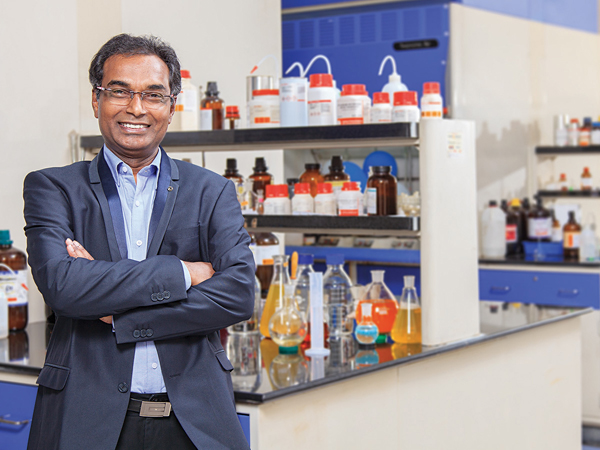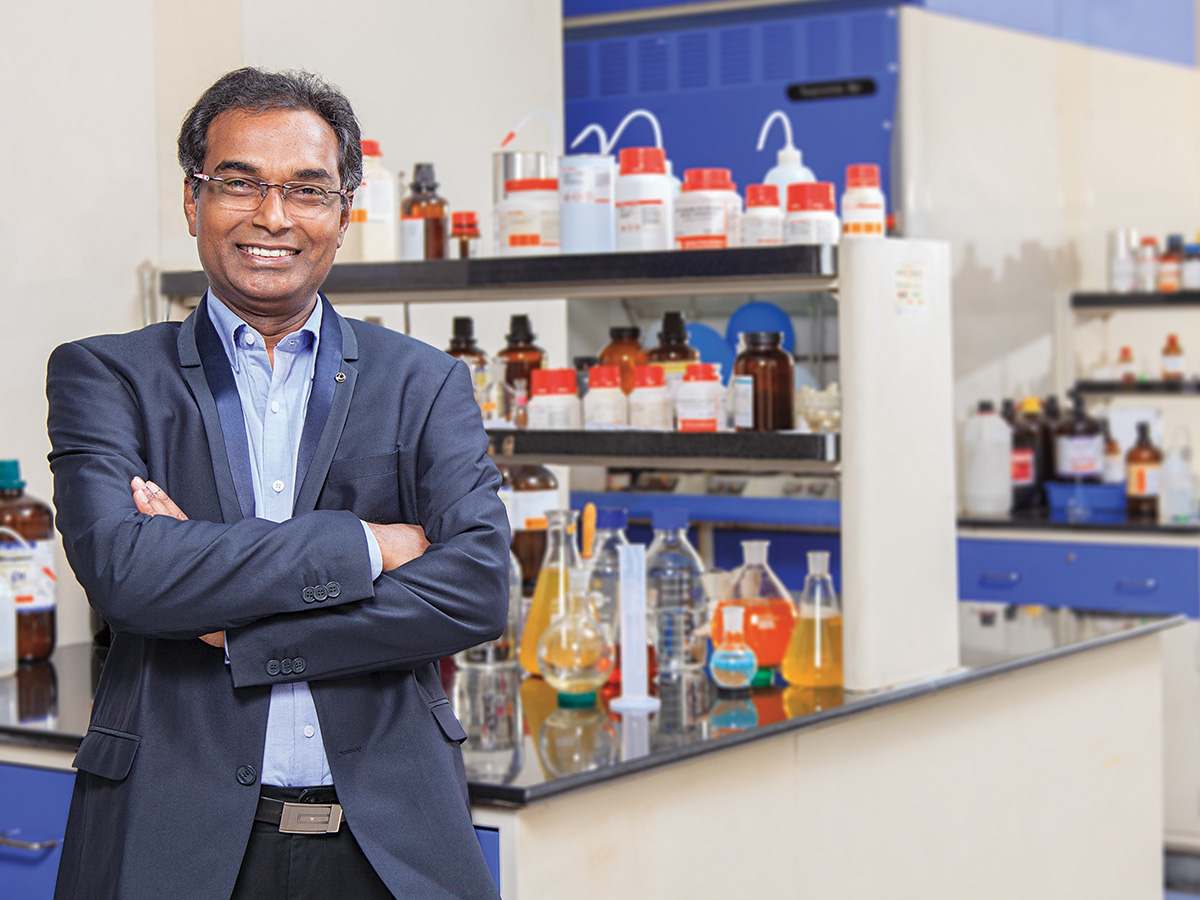The Infosys Prize 2014 in Physical Sciences is awarded to Dr. S. Chandrasekhar for his diverse and notable contributions in synthetic organic chemistry with special focus on the synthesis of complex molecules from natural sources. He has devised innovative, practical approaches to pharmaceuticals of current interest to industry.
Infographic:
Affordable Drugs Using Clean Green Methods
Scope and Impact of Work
Dr. S. Chandrasekhar has displayed a flair for identifying and synthesizing molecules of biological relevance, topical synthetic interest and utility to industry. His research efforts, with an impressive degree of innovation and enterprise, have led to the synthesis of complex and scarcely available natural products and new molecular entities for affordable healthcare. His endeavors have provided cost-effective technologies to the chemical industry through the identification of new reagents / solvents for specific transformations.
Chandrasekhar's group has synthesized several classes of complex natural products in optically pure form employing chiral pool precursors and catalytic asymmetric reactions and his syntheses of pladienolide, azumamide and bengazole bear testimony to the efficacy of such approaches.
His passion and commitment to topical health-related problems is evident in his provisioning for better and affordable access to important drugs. This includes his synthesis of bedaquiline, the first drug approved by FDA in over 40 years for the treatment of multidrug-resistant TB. His team at IICT has developed a scalable synthetic route for misoprostol (a hormone-like biologically important synthetic prostaglandin), used to prevent gastric ulcer, induce labor and / or safely terminate unwanted pregnancies, and this has already been commercialized.
Chandrasekhar has developed methodologies and reagents which help in achieving the synthesis of structurally complex bio-actives in lesser number of steps and avoid the use of hazardous solvents. His contribution in this area has been the promotion of PEG (polyethyleneglycol) as an eco-friendly solvent for processing and recycling expensive metal catalysts based on Palladium, Osmium and Ruthenium in diverse reactions. This work has inspired researchers worldwide to use PEG.
Chandrasekhar has mentored many doctoral and post-doctoral students and is recognized as an inspirational leader among the young generation. His research has drawn the attention of pharma and chemical companies in India and helped enhance their competitiveness.
Bio
Dr. Srivari Chandrasekhar is Chief Scientist and Head, Division of Natural Products Chemistry at the Indian Institute of Chemical Technology (IICT). He received his B.Sc. (1982), M.Sc. (1985) and Ph.D. (1991) degrees from Osmania University, and pursued post-doctoral research at the UT Southwestern Medical Center, Dallas, USA, with Prof. J. R. Falck. As a Humboldt Fellow at the University of Göttingen, he worked on the synthesis of hybrid natural products with Prof. L. F. Tietze.
Chandrasekhar was instrumental in setting up the state-of-the-art Molbank facility at the IICT for the storage and retrieval of chemical samples for HT screening.
He has over 240 publications in national and international journals. He has mentored a large number of doctoral and post-doctoral students and won several awards, including the INSA medal for Young Scientists, CSIR Young Scientist Award, AVRA Young Scientist Award, and the FAPCCI award.
He and his team won the CSIR Technology Award, 2014 for commercializing the process for misoprostol. He is a Fellow of the Indian Academy of Sciences, Bangalore, the National Academy of Sciences, Allahabad, and the Indian National Science Academy, New Delhi.
Timeline
Jury Citation
Dr. Chandrasekhar's group has synthesized over 30 complex natural products and developed several processes to provide better and affordable access to important drugs. Among these is bedaquiline, the first drug approved by FDA in over 40 years for the treatment of multidrug-resistant TB, which Dr. Chandrasekhar has synthesized through simpler transformations and higher yields to make it affordable and accessible.
He, along with his team, has developed a scalable synthetic route for misoprostol (a hormone similar to biologically important synthetic prostaglandin). This is used to prevent gastric ulcer, induce labor and / or safely terminate unwanted pregnancies. This has already been commercialized.
HDr. Chandrasekhar has mentored a large number of doctoral and post-doctoral students and is recognized as an inspirational leader among the young generation. His research has drawn the attention of pharma and chemical companies in India and helped many of them enhance their competitiveness.

Srivari Chandrasekhar reacts to winning the Infosys Prize
Congratulations Srivari for winning the 2014 Prize in Physical Sciences. Your work was impressive not only in the breadth of chemistry it covered but also for its impact on society. In fact your approach of concept to commercialization or ‘bench to bed’ is truly unique for academic scientists in the Indian context. Not only has your work had important ramifications in chemistry but it will affect branches of society such as drugs and pharmaceuticals; agro chemicals and materials. Congratulations again.



